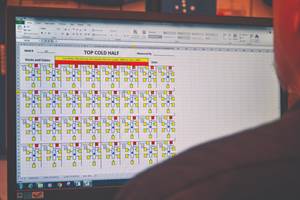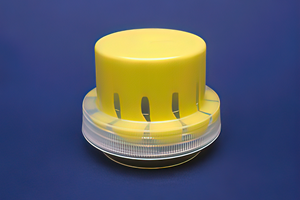Delcam Seeks to Accelerate Sales Growth at Four U.S. Trade Events
Delcam will seek to further accelerate the growth in the sales of its range of CAM systems at four US trade shows in October.
The company will demonstrate the 2012 versions of its PowerMILL, FeatureCAM, PartMaker and Delcam for SolidWorks software at the North Texas Machine Tool Show in Dallas on 5th and 6th October, at the Southtec exhibition in Charlotte from 11th to 13th October and at the Wichita Industrial Trade Show in West Douglas from 18th to 20th October. In addition, Delcam will be represented by both its PartMaker Division and its reseller, Programming Plus, at the Wisconsin Manufacturing and Technology Show from 4th to 6th October.
“Delcam increased its software sales in North America by almost 30% in the first half of this year compared with the opening six months of 2010,” said Delcam North America President, Glenn McMinn. “With the many enhancements in our new versions and our regular appearances at trade shows across the country, we are hopeful of seeing further strong growth for the rest of this year.”
“A significant increase in machine tool sales has been reported for the first part of this year,” he added. “This has historically been followed by an increase in sales of CAM software. Companies often find that they cannot gain the full benefits of their investment in new equipment with their existing CAM system and so start to look at the more powerful and more flexible programs that we can provide.”
“Delcam employs the largest development team in the CAM industry,” stated Mr. McMinn. “This means that we can anticipate developments from the leading machine tool companies, for example, by producing post-processors for new equipment as soon as it is introduced to the market. In contrast, companies with smaller development teams cannot keep up with the rapid developments in machine tool technology so their customers cannot benefit fully from any investment in new equipment.”
Delcam’s development team has been working hard on the latest round of software releases. The 2012 version of PowerMILL, Delcam’s system for high-speed and five-axis machining, includes a number of new strategies, together with more general enhancements to make programming faster and machining more efficient with the best-possible surface finish. The most important of these new options is flowline machining. With flowline machining, the toolpath is divided between a pair of drive curves in a constant number of passes, rather than having a varying number of passes with a constant stepover. This approach gives a better surface finish on the part and minimizes wear on the cutter and the machine tool.
FeatureCAM 2012, the latest version of Delcam’s feature-based programming system, includes a range of enhancements that give faster and easier programming, and produce more efficient toolpaths to give greater machine productivity. Two new strategies are available – back boring and spiral roughing. Back boring allows more parts to be completed in a single set-up, with larger bores able to be produced on the reverse side of the part. Spiral roughing can be used instead of Z-level roughing. It uses a single continuous toolpath instead of a series of levels and so gives a smoother finish with no dwell marks.
Major highlights of PartMaker 2012, Delcam’s software for turn-mill equipment, bar-fed mills and Swiss-type lathes, include a new module for the simulation of vertical and horizontal machining centers, improved simulation for the latest breed of multi-axis, turn-mill and Swiss-lathe machine architectures, more powerful surface machining strategies, and improved visualization throughout programming, as well as a host of additional productivity enhancements.
The 2012 version of Delcam for SolidWorks, the integrated CAM system for SolidWorks, includes programming of 2D wire EDM for the first time alongside the comprehensive options for the programming of turning and mill-turn equipment, drilling and two- through five-axis milling. Other enhancements include target-part comparison, the ability to compare a model of the desired final shape with the shape achieved by the programmed toolpaths; fully-automated de-burring and chamfering; and multiple-instance programming, the programming of multiple SolidWorks components in one operation.
Related Content
How to Analyze and Optimize Cutting Conditions to Reduce Cycle Time
Plastic injection mold design and manufacturing company puts NC program optimization software module to the test. The results were surprising.
Read MoreWhat Is Scientific Maintenance? Part 1
Part one of this three-part series explains how to create a scientific maintenance plan based on a toolroom’s current data collection and usage.
Read MoreWhat is Scientific Maintenance? Part 2
Part two of this three-part series explains specific data that toolrooms must collect, analyze and use to truly advance to a scientific maintenance culture where you can measure real data and drive decisions.
Read MoreHow to Manage Wall Thickness Changes in Your Mold Design
To ensure even filling and cooling, consider wall section transitions, corners and fillets, ribs and bosses, lip and rim designs and CAE flow simulation software.
Read MoreRead Next
Reasons to Use Fiber Lasers for Mold Cleaning
Fiber lasers offer a simplicity, speed, control and portability, minimizing mold cleaning risks.
Read MoreHow to Use Continuing Education to Remain Competitive in Moldmaking
Continued training helps moldmakers make tooling decisions and properly use the latest cutting tool to efficiently machine high-quality molds.
Read MoreAre You a Moldmaker Considering 3D Printing? Consider the 3D Printing Workshop at NPE2024
Presentations will cover 3D printing for mold tooling, material innovation, product development, bridge production and full-scale, high-volume additive manufacturing.
Read More











.jpg;maxWidth=300;quality=90)









